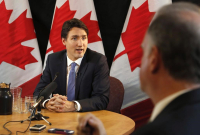Support strong Canadian climate journalism for 2025
By Alexander Panetta
A veteran of the Obama White House who specialized in international outreach says Canada's rookie prime minister has an extremely rare opportunity for a foreign leader: the chance to be heard by Americans.
Brett Bruen shared some thoughts in advance of Justin Trudeau's red-carpet visit this week, based on his own career as a U.S. diplomat who until recently was the White House director of global engagement.
He said foreign leaders are forever struggling to get American attention — for themselves, but more importantly for the priorities that matter to them and their citizens.
''It's incredibly challenging," Bruen said in an interview.
Washington receives a staggering number of high-profile visits — last year the Chinese president was overshadowed by another guest arriving the same week, Pope Francis.
Bruen said Canada's new leader has an opportunity to be heard amid that noise.
Trudeau has become a minor U.S. celebrity — with profiles in Vogue magazine, the style and review sections of the New York Times, in the Washington Post this week and CBS's 60 Minutes on Sunday. The 60 Minutes piece among other things touched on Trudeau's childhood at the side of his father Pierre Trudeau, his much publicized charity boxing match with Sen. Patrick Brazeau, his government's move to accept more Syrian refugees and the decision to pull fighter jets out of the fight against the Islamic State.
Bruen said Trudeau could capitalize by doing more unconventional media. He suggested reaching Americans who don't follow the news — in places as unusual as sitcom appearances.
"Establish him as an American celebrity... That's one of the unique opportunities offered by his prime ministership," said Bruen, who left the White House last year and now advises clients at Global Situation Room.
"Here's someone who's young, dynamic, who's piqued the interest certainly of pundits and observers. Now you want to go capture the interest of the man or woman on the street who'll say, 'Yeah, I know Prime Minister Trudeau. When he speaks about immigration issues or climate change or trade, I'm going to pay closer attention, because he's someone that I see regularly.'''
That level of attention can be a double-edged sword.
The risk-reward potential was evident last week, in two headlines in the U.S. congressional newspaper, The Hill. One may have been intended as a compliment: "'Canadian Obama' to visit White House." But there were some less-than-flattering responses to, "Canada's prime minister to Americans: Pay more attention to the world."
What's beyond dispute is how rare all of this is for a Canadian leader.
It's in some ways a throwback to another era.
The Canadian Press examined American news coverage of every prime ministerial visit to the U.S. since 1933 and found two clear, long-term trendlines: Far fewer bilateral meetings with visiting Canadian leaders, and a huge drop in the level of attention American media pay to them.
Canadian prime ministers used to visit often, sometimes multiple times per year. American newspaper writers would run long stories in prominent places on even the non-answers of the famously tight-lipped Mackenzie King.
Not only did prime ministers address Congress. So did governor-general Vincent Massey, in 1954, and it got big front-page treatment in the New York Times — an almost unthinkable scenario today.
The big shift started in the 1950s, as jet travel took leaders to more distant destinations and new international organizations replaced one-on-one meetings.
A former Canadian ambassador to Washington said Trudeau has a chance to reverse some of that. He predicted more attention to this state-level visit than the last one, which he helped organize in 1997.
"We're under the radar most of the time," Raymond Chretien said.
"With the U.S., there's more interest in the countries that represent a threat. If Ayatollah Khamenei was coming to Washington, that would get more media attention than a Canadian prime minister.
"I think there will be a lot more media attention this time than the last (state dinner in 1997) — because it's a new government, a new prime minister, very young, who has a name that resonates with people. Americans remember his dad."



Comments